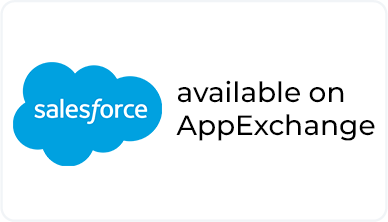
The Powerful Partnership: Leveraging Salesforce and WhatsApp for Enhanced Customer Relationship Management
Looking to enhance your customer relationship management (CRM) strategies?
Look no further than the powerful partnership between Salesforce and WhatsApp using WatBox . By integrating these two platforms, businesses can create a seamless and streamlined communication channel with their customers, leading to improved customer satisfaction, increased sales, and enhanced brand loyalty.
Salesforce is known for its robust CRM solutions, offering a wide range of tools and features to help businesses manage their customer interactions effectively. On the other hand, WhatsApp is the world's most popular messaging app, with over 2 billion users. By connecting WhatsApp with Salesforce, businesses can leverage the benefits of both platforms, allowing them to communicate with customers in real-time, provide personalized support, and build long-lasting relationships.
This integration enables businesses to centralize all customer interactions, including messages, calls, and chat conversations, within the Salesforce platform. This unified approach ensures that teams have a complete view of each customer's journey, enabling them to provide customized and timely solutions. With the power of Salesforce and WhatsApp combined, businesses can take their CRM strategies to new heights, fostering stronger customer relationships and driving business growth.
The Importance of Customer Relationship Management (CRM)
Before diving into the benefits of integrating Salesforce and WhatsApp, it is crucial to understand the importance of CRM in today's business landscape. Customer relationship management encompasses various strategies, processes, and technologies aimed at managing and nurturing customer relationships throughout the customer lifecycle. It involves gathering and analyzing customer data to gain insights, implementing targeted marketing campaigns, providing personalized support, and ensuring customer satisfaction.
In a highly competitive market, businesses that prioritize effective CRM strategies gain a significant competitive edge. By understanding customer needs and preferences, businesses can tailor their offerings to meet those needs, resulting in higher customer satisfaction and increased loyalty. CRM also enables businesses to identify upselling and cross-selling opportunities, optimize sales processes, and provide timely and relevant support. With the right CRM tools and strategies in place, businesses can foster long-lasting relationships with their customers, leading to increased sales, improved customer retention, and enhanced brand reputation.
Benefits of Integrating Salesforce and WhatsApp
Integrating Salesforce and WhatsApp offers numerous benefits for businesses looking to enhance their CRM strategies. Let's explore some of these benefits in detail:
1. Real-Time Communication
By connecting WhatsApp with Salesforce, businesses can communicate with their customers in real-time. WhatsApp's instant messaging capabilities allow businesses to respond promptly to customer inquiries, provide immediate support, and address issues as they arise. Real-time communication not only improves customer satisfaction but also enhances the overall customer experience.
2. Personalized Support
With the integration of Salesforce and WhatsApp, businesses can provide personalized support to their customers. By accessing customer data stored in Salesforce, businesses can gain insights into customer preferences, purchase history, and previous interactions. This information enables businesses to deliver tailored solutions and recommendations, strengthening customer relationships and loyalty.
3. Streamlined Customer Interactions
Integrating Salesforce and WhatsApp centralizes all customer interactions within the Salesforce platform. This unified approach ensures that teams have a complete view of each customer's journey, including messages, calls, and chat conversations. Having all communication channels in one place allows businesses to track customer interactions more efficiently, identify trends, and provide consistent and seamless experiences across different touchpoints.
4. Enhanced Team Collaboration
Salesforce and WhatsApp integration facilitates better collaboration among teams. With all customer conversations and updates available within Salesforce, different teams, such as sales, marketing, and customer support, can access and update customer information in real-time. This collaboration ensures that teams are aligned, enabling them to provide cohesive and personalized experiences to customers throughout their journey.
5. Improved Reporting and Analytics
Integrating Salesforce and WhatsApp provides businesses with comprehensive reporting and analytics capabilities. By capturing customer interactions and data from WhatsApp within Salesforce, businesses can gain valuable insights into customer behavior, preferences, and trends. These insights can be used to optimize marketing campaigns, identify areas for improvement, and make data-driven decisions to enhance overall CRM strategies.
How Salesforce and WhatsApp Integration Works
Integrating Salesforce and WhatsApp involves connecting the two platforms and enabling seamless data transfer and communication. Here's an overview of how the integration works:
- API Integration : Salesforce provides APIs (Application Programming Interfaces) that allow developers to connect WhatsApp with Salesforce. These APIs facilitate the exchange of data and messages between the two platforms.
- Authentication and Authorization: To ensure secure and authorized access, businesses need to authenticate and authorize the integration between Salesforce and WhatsApp. This step ensures that only authorized users can access and interact with customer data.
- Data Mapping and Synchronization: Once the integration is established, businesses need to map and synchronize data between Salesforce and WhatsApp. This step involves defining which fields and data points should be synchronized between the two platforms.
- Automated Workflows and Triggers: To streamline processes and automate tasks, businesses can set up workflows and triggers within Salesforce. These workflows can be configured to trigger specific actions or notifications based on customer interactions on WhatsApp.
- Real-Time Notifications: Salesforce can be configured to send real-time notifications to relevant teams or individuals whenever there is a new customer inquiry or interaction on WhatsApp. These notifications ensure that businesses can respond promptly and provide timely support.
- Analytics and Reporting: Salesforce's robust analytics and reporting capabilities can be leveraged to track and analyze customer interactions on WhatsApp. This data can be used to generate reports, measure performance, and gain insights into customer behavior and preferences.
By following these steps, businesses can establish a seamless integration between Salesforce and WhatsApp, unlocking the full potential of both platforms and enhancing their CRM strategies.
Strategies for Leveraging the Combined Power of Salesforce and WhatsApp
Now that we understand the benefits and integration process of Salesforce and WhatsApp, let's explore some effective strategies for leveraging the combined power of these platforms to enhance CRM:
1. Provide Proactive Customer Support
With Salesforce and WhatsApp integration, businesses can offer proactive customer support by leveraging WhatsApp's instant messaging capabilities. By monitoring customer interactions and sentiment in real-time, businesses can identify potential issues or queries and reach out to customers proactively. This proactive approach not only enhances customer satisfaction but also helps businesses resolve issues before they escalate.
2. Implement Personalized Marketing Campaigns
The integration of Salesforce and WhatsApp enables businesses to personalize their marketing campaigns based on customer preferences and behavior. By analyzing customer data stored in Salesforce, businesses can send targeted and relevant messages to customers via WhatsApp, such as personalized product recommendations or exclusive offers. This personalized approach helps businesses build stronger relationships with customers and drive higher engagement and conversions.
3. Automate Routine Tasks and Processes
Salesforce's workflows and triggers can be leveraged to automate routine tasks and processes related to customer interactions on WhatsApp. For example, businesses can set up automated responses to frequently asked questions, saving time for both customers and support teams. Automation streamlines processes, improves efficiency, and enables teams to focus on more complex and value-added tasks.
4. Enable Self-Service Options
Integrating Salesforce and WhatsApp can enable businesses to provide self-service options to customers. By integrating a knowledge base or FAQ section within WhatsApp, businesses can empower customers to find answers to common queries on their own. This self-service approach reduces the workload on support teams and provides customers with instant access to information, enhancing the overall customer experience.
5. Gather Customer Feedback and Insights
WhatsApp can be used as a channel for gathering customer feedback and insights. By sending surveys or feedback requests via WhatsApp, businesses can collect valuable data on customer satisfaction, product preferences, and suggestions for improvement. This data can be integrated into Salesforce, allowing businesses to analyze and act upon customer feedback to drive continuous improvement.
Implementing these strategies allows businesses to harness the combined power of Salesforce and WhatsApp, creating a comprehensive and effective CRM solution that drives customer satisfaction, loyalty, and business growth.
Case Studies of Successful Salesforce and WhatsApp Integration
To further understand the impact of integrating Salesforce and WhatsApp, let's explore a few real-world case studies:
Case Study 1: Immigration Law Firm
The Company is a law firm specializing in immigration law and adoption law. Their services include assisting businesses in legally petitioning for foreign workers, preparing successful applications for permanent residency and citizenship, and representing underserved populations such as immigrant women and unaccompanied children. They are dedicated to passionately representing the interests of their clients.
Established in 2003, the firm is based in Salem, Virginia, and utilizes Salesforce as its primary matter management system.
Watbox proposed and implemented a solution within their Salesforce instance, integrating a single sales number. This enables case managers and paralegals to initiate conversations with prospects directly from Salesforce Matter (case) through the WhatsApp channel. All customer responses regarding the Matter are conveniently accessible to the Matter team through WhatsApp.
Case Study 2: Non-profit Organization
The Organization is a nonprofit organization, dedicated to serving the devotees in Australia. They recently established the Southern Hemisphere providing a spiritual haven for followers. It is actively involved in fundraising campaigns and managing devotee activities to support their mission and temple operations.
The client faced challenges in effectively connecting with their devotees via email. They struggled to keep devotees informed about ongoing campaigns, events, and activities due to low email engagement rates. The organization sought a solution to improve communication channels and ensure devotees remained aware and engaged with initiatives.
These case studies demonstrate the tangible benefits of implementing WatBox, highlighting how businesses across different industries can leverage this powerful partnership to enhance their CRM strategies and drive success.
Best Practices for Implementing Salesforce and WhatsApp Integration
While integrating Salesforce and WhatsApp offers significant benefits, it is essential to follow best practices to ensure a smooth and successful implementation:
- Define Clear Objectives: Clearly define your objectives and desired outcomes before initiating the integration. This will help you align your integration efforts with your CRM goals and ensure that you focus on the most crucial aspects.
- Map Data and Workflows: Take the time to map the data fields and workflows between Salesforce and WhatsApp. Ensure that the necessary data points are synchronized and that automated workflows align with your business processes.
- Train and Educate Users: Provide comprehensive training and education to your teams on how to use the integrated Salesforce and WhatsApp solution. This will ensure that they can fully leverage the capabilities of the integration and provide the best possible support to customers.
- Monitor and Analyze: Continuously monitor and analyze customer interactions on WhatsApp. Leverage Salesforce's reporting and analytics capabilities to gain insights into customer behavior and preferences. Use this data to refine your CRM strategies and improve customer experiences.
- Stay Updated: Keep up with the latest updates and releases from both Salesforce and WhatsApp. Regularly update your integration to leverage new features and functionalities that can further enhance your CRM strategies.
By following these best practices, businesses can maximize the benefits of integrating Salesforce and WhatsApp, ensuring a seamless and effective CRM solution.
Common Challenges and How to Overcome Them
While integrating Salesforce and WhatsApp offers significant advantages, businesses may face a few challenges during the implementation process. Here are some common challenges and strategies to overcome them:
While integrating Salesforce and WhatsApp offers significant advantages, businesses may face a few challenges during the implementation process. Here are some common challenges and strategies to overcome them:
- Data Security and Privacy Concerns: Businesses must ensure that customer data shared between Salesforce and WhatsApp remains secure and complies with data privacy regulations. Implement robust security measures, such as encryption and access controls, to protect customer data.
- Technical Integration Complexity: The technical integration between Salesforce and WhatsApp may require expertise and resources. Engage experienced developers or consultants who specialize in Salesforce and WhatsApp integrations to ensure a smooth implementation.
- User Adoption and Training: Ensure that your teams are properly trained and educated on using the integrated solution. Conduct training sessions, provide user guides, and offer ongoing support to encourage user adoption and maximize the benefits of the integration.
- Managing High Volumes of Customer Interactions: With the integration of Salesforce and WhatsApp, businesses may experience a surge in customer interactions. Implement strategies to manage high volumes effectively, such as leveraging automation, setting up chatbots, or scaling your support teams accordingly.
By proactively addressing these challenges and implementing appropriate strategies, businesses can overcome potential hurdles and successfully integrate Salesforce and WhatsApp to enhance their CRM strategies.
Future Trends in Salesforce and WhatsApp Integration for CRM
As technology continues to evolve, so does the integration between Salesforce and WhatsApp for CRM. Here are some future trends to watch out for:
- Artificial Intelligence (AI) and Chatbots: The integration of AI and chatbot technologies with Salesforce and WhatsApp can enhance customer interactions further. AI-powered chatbots can provide instant responses, personalized recommendations, and proactive.
Level up WhatsApp Integration with Salesforce
Start with a 30 day trial for you to taste the CRM + WhatsApp interactions!



